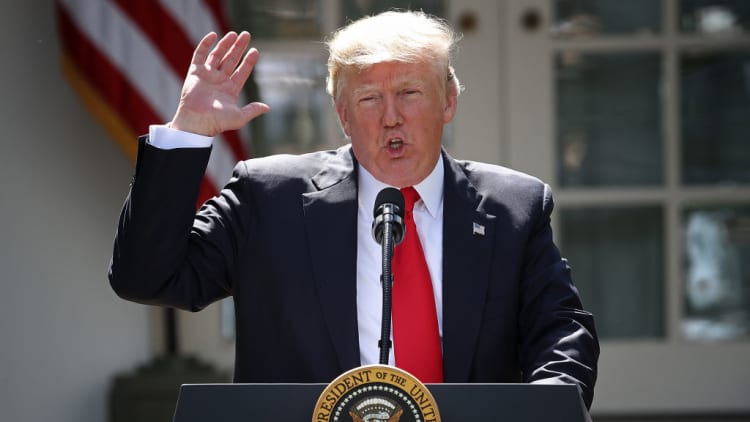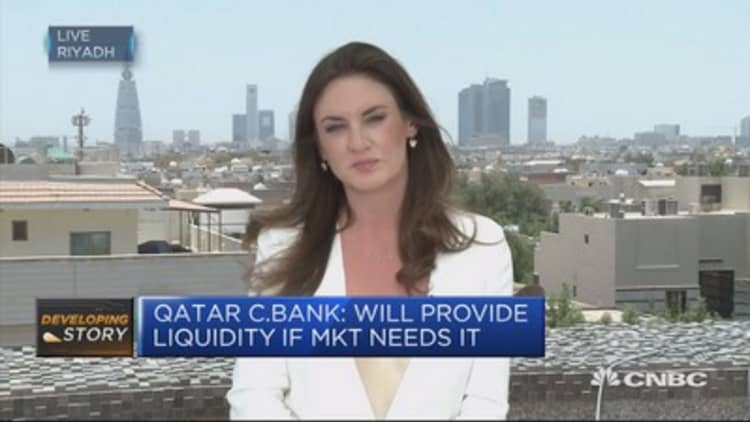
President Donald Trump again undercut officials in his own administration on Tuesday by blasting out a series of tweets that cheered Arab states isolating Qatar — and possibly encouraged them to keep up their pressure in the process.
On Monday, Saudi Arabia, the United Arab Emirates, Egypt and Bahrain cut diplomatic ties and transportation links with Qatar, a fellow member of OPEC. The nations have long criticized Qatar's support for Islamist groups such as the Muslim Brotherhood.
If he's willing to publicly align himself with the Saudi and Emirati position, I don't see how we have a diplomatic off ramp in the near term.Helima Crofthead of commodities research, RBC Capital Markets
U.S. officials immediately downplayed the friction between Qatar and its neighbors and counseled restraint. Secretary of State Rex Tillerson encouraged the countries "to sit down together and address" their differences.
But on Tuesday morning, Trump applauded Qatar's neighbors and even took partial credit for their assertiveness.
Trump's tweets raise questions about whether he either
She noted that Tillerson, who is also the former CEO of Exxon Mobil, is familiar with the region and ideally suited to lead a diplomatic resolution between the Arab states. But Trump is complicating efforts to resolve the crisis and undercutting Tillerson, Croft said.

"If he's willing to publicly align himself with the Saudi and Emirati position, I don't see how we have a diplomatic off-ramp in the near term," she told CNBC.
"I think the Qataris want an off-ramp, but if you're the Saudis, are you going to back off your maximalist demands at this point?"
Those demands likely will include dropping support for the Muslim Brotherhood — a Sunni Islamist group that was elected to power in Egypt after the Arab Spring, then forced out by a military coup — and potentially muzzling Al Jazeera, the Qatari news agency that has been a thorn in Gulf powers' side, Croft said.
White House Press Secretary Sean Spicer contradicted the president's sentiment on Tuesday by saying Trump was "very heartened" by his "constructive conversation" with the emir of Qatar two weeks ago. Spicer said the emir had shown commitment to joining a new U.S.-Saudi initiative to disrupt terror financing.
Sharpening tensions
It's significant to note that nations in the Middle East and beyond believe that Qatar or individuals who live there financially support terrorism. Qatar has denied such accusations, but regardless, the perception that it's linked to terror groups is quickly growing more costly.
On Monday, risk consultancy the Eurasia Group said, "The recent measures by the anti-Qatar alliance signal commitment to forcing a complete change in Qatari policy or creating an environment for leadership change in Doha."
Tensions on the Arabian Peninsula may have sharpened after Qatar reportedly made a tremendous ransom payment to Iran-backed militias in Iraq and al-Qaeda affiliates in
Trump's support for a reset in the region was contingent upon the Saudis and Emiratis cutting into terror financing, said Scott Modell, managing director at energy and geopolitical risk consultancy the Rapidan Group.
Much of that financing emanates from Qatar, but the Saudis and Emiratis also play a role, he added.
"'Counter Threat Finance' operations coming to the forefront of the global war on terror is long overdue," Modell said. "It remains to be seen, however, whether the Saudis and Emiratis themselves will fully commit to disrupting and dismantling funding networks that crisscross their own countries."
Complicating matters further is Qatar's Al Udeid Air Base, which hosts the largest U.S. military presence in the Middle East. Al Udeid is also a base for the United States Central Command, which is responsible for U.S. military operations from Egypt to Pakistan and north through Afghanistan all the way to the border with Russia.


